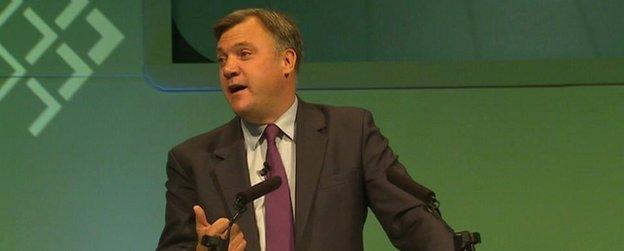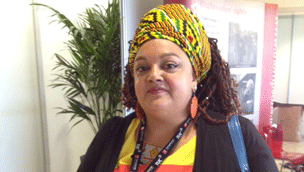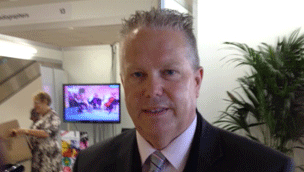TUC delegate view: Relations with Labour
- Published

Much of the art of politics is telling people what they want to hear - or at least appearing to tell people what they want to hear.
A senior Labour politician visiting the annual TUC conference should be in a good position to do this.
Mention of the shared history of "the movement" and a hearty dollop of coalition-bashing always go down well.
But what happens if you actually agree with something the Lib Dems and Conservatives believe in and the activists hate?
Shadow chancellor Ed Balls faced exactly this problem as he travelled down to Brighton.
It was his job to defend Labour's acceptance that a public sector pay freeze was needed to help deal with the deficit.
This is something the government insists is vital to reducing the deficit, but unions argue is pushing their members into poverty and might even force them into co-ordinated strike action.
'Shame'
Mr Balls faced some heckles while he delivered his speech.
In the question-and-answer session afterwards, Unison delegate Liz Cameron elicited loud cheers when she challenged the shadow chancellor: "Why are you here to offer support to the Tory pay freeze when I'm having to make tough choices, like whether or not I'm able to buy food?

Zita Holbourne: I can't see Miliband returning to the way Labour was in a hurry.
"Why are you expecting the support of hundreds of thousands of public service workers when you continue to repeat that position?"
Mr Balls explained that a pay freeze was vital to securing jobs, which caused grumbles in the hall and led one man to shout: "Shame."
But what do delegates at the TUC conference think the Labour leadership needs to do?
Brian Hewitt, a Unite activist from Northern Ireland, said: "For a start they need to get rid of the anti-trade union laws if they get back in power. The feeling is that they've not taken up the fight enough on our behalf.
"They didn't do anything when they were in power and they're still not promising to do so. That's annoyed a lot of trade unionists."
'Middle class'
He added: "It was the union movement that swung the leadership election for Ed Miliband. He and his colleagues need to reassure the trade unions that they are on their side, not just give warm reassurances and vague promises. Otherwise they will get nowhere."
Zita Holbourne, of the Public and Commercial Services Union, which is not affiliated to Labour, felt there was a lack of personal chemistry between workers and Mr Miliband's team.
She said: "I left the party during the second term under Blair. I can't see Miliband returning to the way Labour was in a hurry.
"The leaders aren't from the working class. The top people in the party come from the middle class and Oxbridge."

Steve Kemp: People have a right to strike
Steve Kemp, a GMB activist from Wakefield, West Yorkshire, advised a conciliatory approach, with some give and take on both sides.
He said: "Labour has always been a broad church and the Labour leadership will have their opinions, many of which we support. There have been differences over strike action.
"We agree that strikes should be a last resort, but people have a right to strike."
Labour is enjoying an opinion poll lead over the Conservatives, but some question whether it is large enough.
Mr Kemp said: "At the last election we [Labour] suffered just about the biggest defeat in our history. We are beginning to find our feet and providing opposition to the Conservatives. The opposition to the Tories is enormous and it needs to be harnessed."
Elaine Jones, of Unite, agreed, saying: "I think that if the Labour Party want trade union members and working people to vote for them at the next election, they have to make some clear commitments on the issues that affect people."
She urged more focus on opposing the government's NHS reforms and a fearless approach to the media: "Labour shouldn't even try to get the Daily Mail and the Murdoch press onside. We are never going to please them."
Mr Balls left the hall to polite applause and much to contemplate ahead of Labour's annual conference, which starts at the end of this month.
- Published11 September 2012
- Published10 September 2012
- Published9 September 2012
- Published11 September 2012
- Published7 September 2012